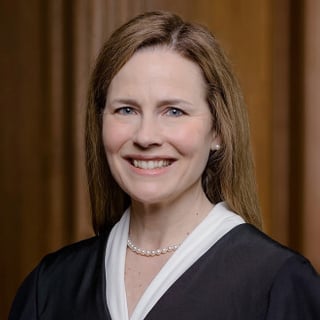Justice Amy Coney Barrett Addresses Supreme Court’s Role Amid Trump’s Executive Actions
Justice Amy Coney Barrett, appointed by former President Donald Trump in 2020, has transitioned from a long-standing teaching position at the University of Notre Dame to a pivotal role on the Supreme Court. In her first major television interview since taking the bench, Barrett discussed her perceptions of the Court’s ideological balance, her new memoir, and the ongoing legal discussions surrounding executive power.
Shifts in Ideology and Personal Reflections
Barrett addressed whether the Supreme Court has shifted to a more conservative stance during her tenure. “I think those terms, shifting to the right or left, are labels assigned by others. I judge cases on their individual merits,” she explained. Despite facing criticism from both conservative and liberal sides, Barrett emphasized her belief in the impartiality of her judicial decisions.
In her upcoming book, “Listening to the Law,” Barrett reflects on her five years on the Court and the changes in her personal life. While expressing pride in her role, she admitted missing her previous life in South Bend, Indiana, where she enjoyed a strong sense of community with longtime friends.
Legal Philosophy and Impactful Decisions
One of Barrett’s most consequential votes was her participation in the 2022 Dobbs v. Jackson Women’s Health Organization case, which overturned Roe v. Wade. This landmark decision has significantly altered the landscape of abortion rights in America. When questioned about the implications of the ruling, Barrett noted, “Dobbs did not render abortion illegal. It simply states that these questions are now to be addressed at the state level.”
Addressing concerns raised by former Secretary of State Hillary Clinton regarding the Court’s potential effects on other rights, Barrett asserted that decisions on fundamental rights such as marriage and family remain essential to the fabric of the Constitution. “These rights are fundamental,” she asserted, adding that the Court has made it clear in its established doctrine.
The Role of the Supreme Court in Assessing Executive Power
Barrett’s interview also covered the Supreme Court’s handling of Trump’s executive orders. Critics have argued that the Court has not been stringent enough in checking the bounds of presidential authority. “It’s not our role to politically assess the actions of the current president. Our focus remains on legal questions,” Barrett stated, deflecting concerns that the Court might be enabling an overreach of executive power.
| Case | Date | Impact |
|---|---|---|
| Dobbs v. Jackson Women’s Health Organization | June 24, 2022 | Overturned Roe v. Wade; state control over abortion laws reinstated. |
| Trump’s Executive Orders | Ongoing | Court’s decisions pending on the constitutionality of various executive actions. |
Barrett asserted that future cases regarding executive power, including the president’s ability to impose tariffs or deploy military troops, remain fluid and must be evaluated on a case-by-case basis. Her measured approach reflects a commitment to judicial integrity, emphasizing that decisions require thorough review and consideration of the specific legal circumstances involved.
As the upcoming term approaches, Amy Coney Barrett’s role on the Court remains closely scrutinized, with many anticipating her influence on critical legal developments in the years to come. Reflecting on her journey, Barrett humorously noted her growing experience but insisted that retirement is not on her horizon just yet.

